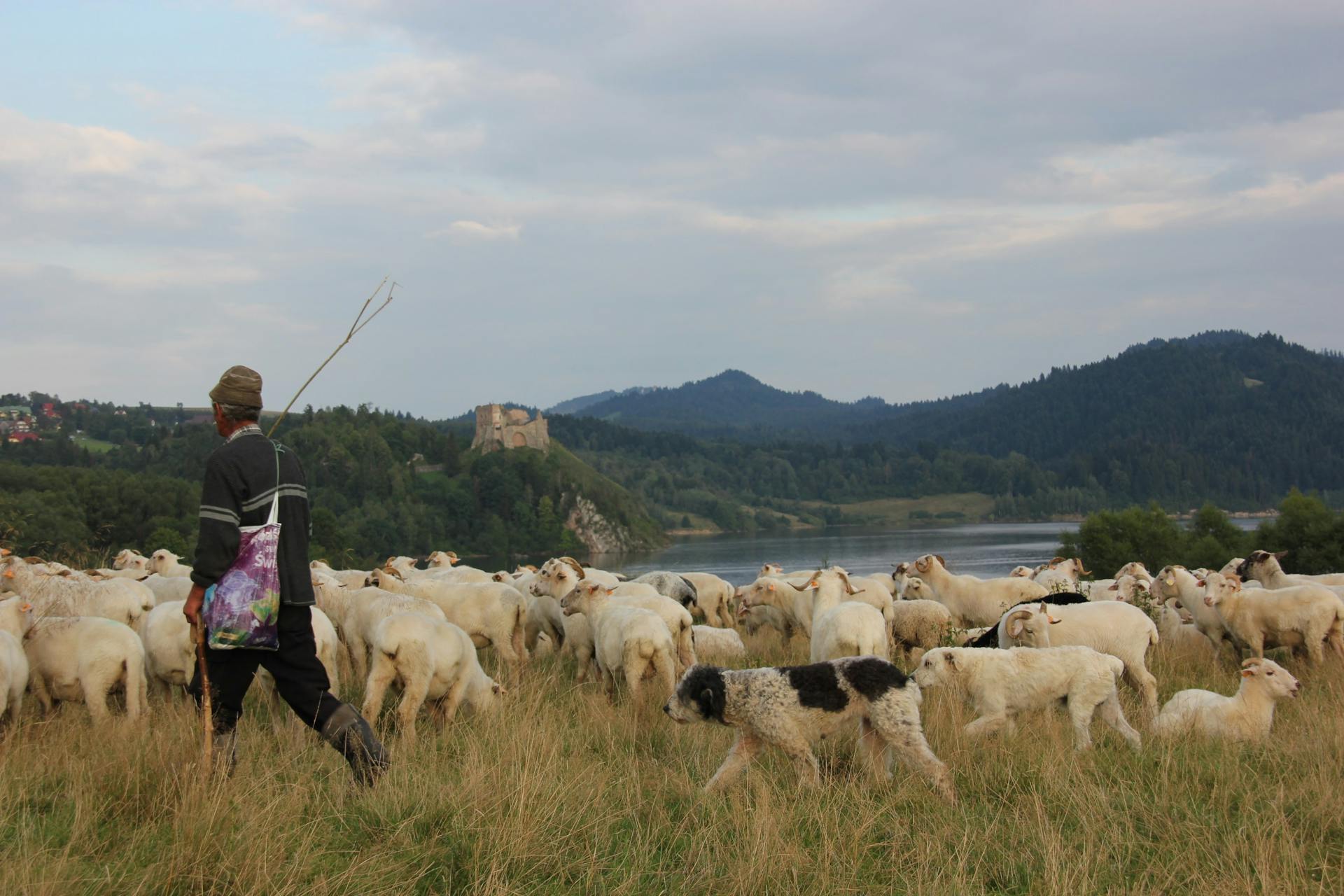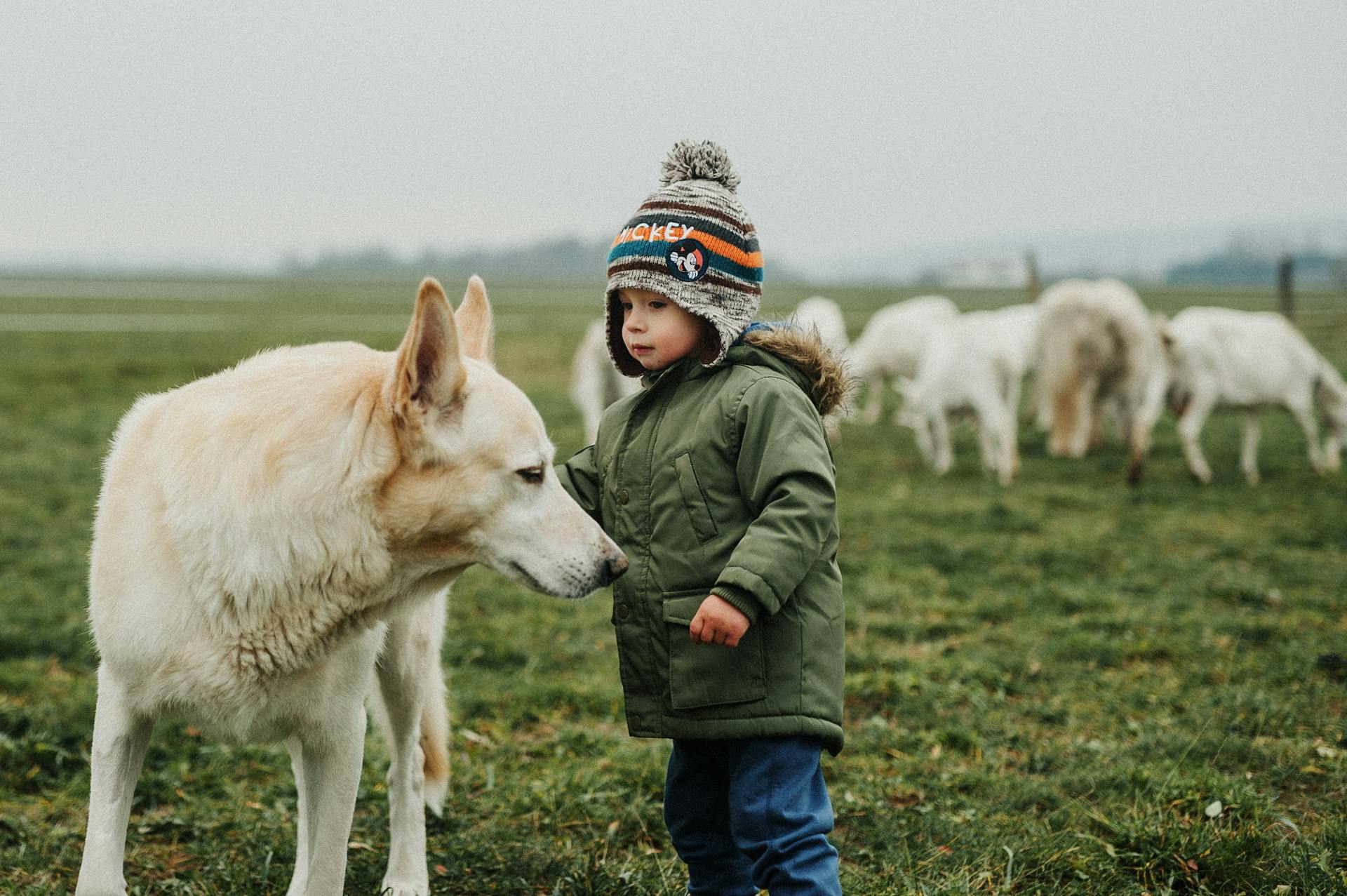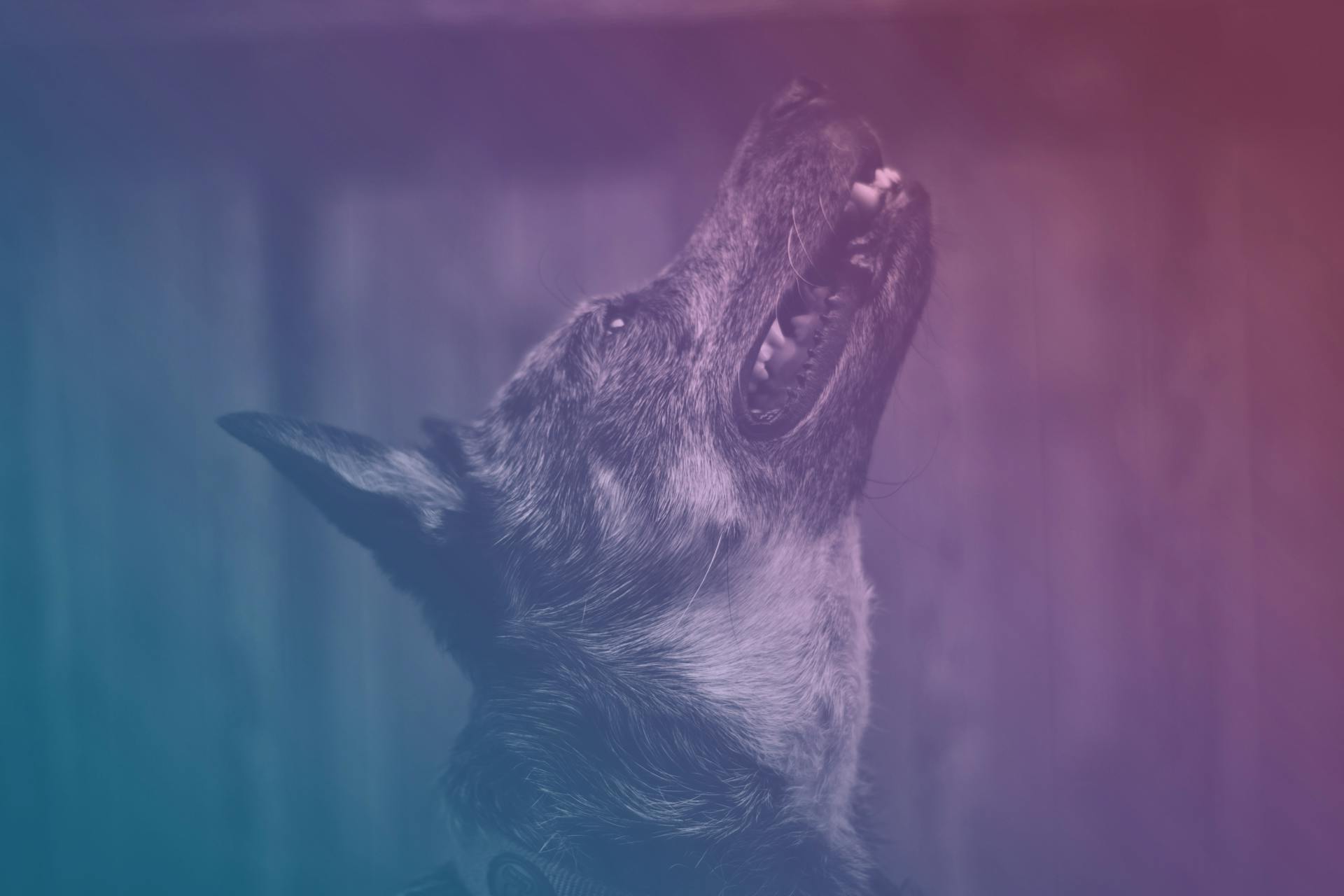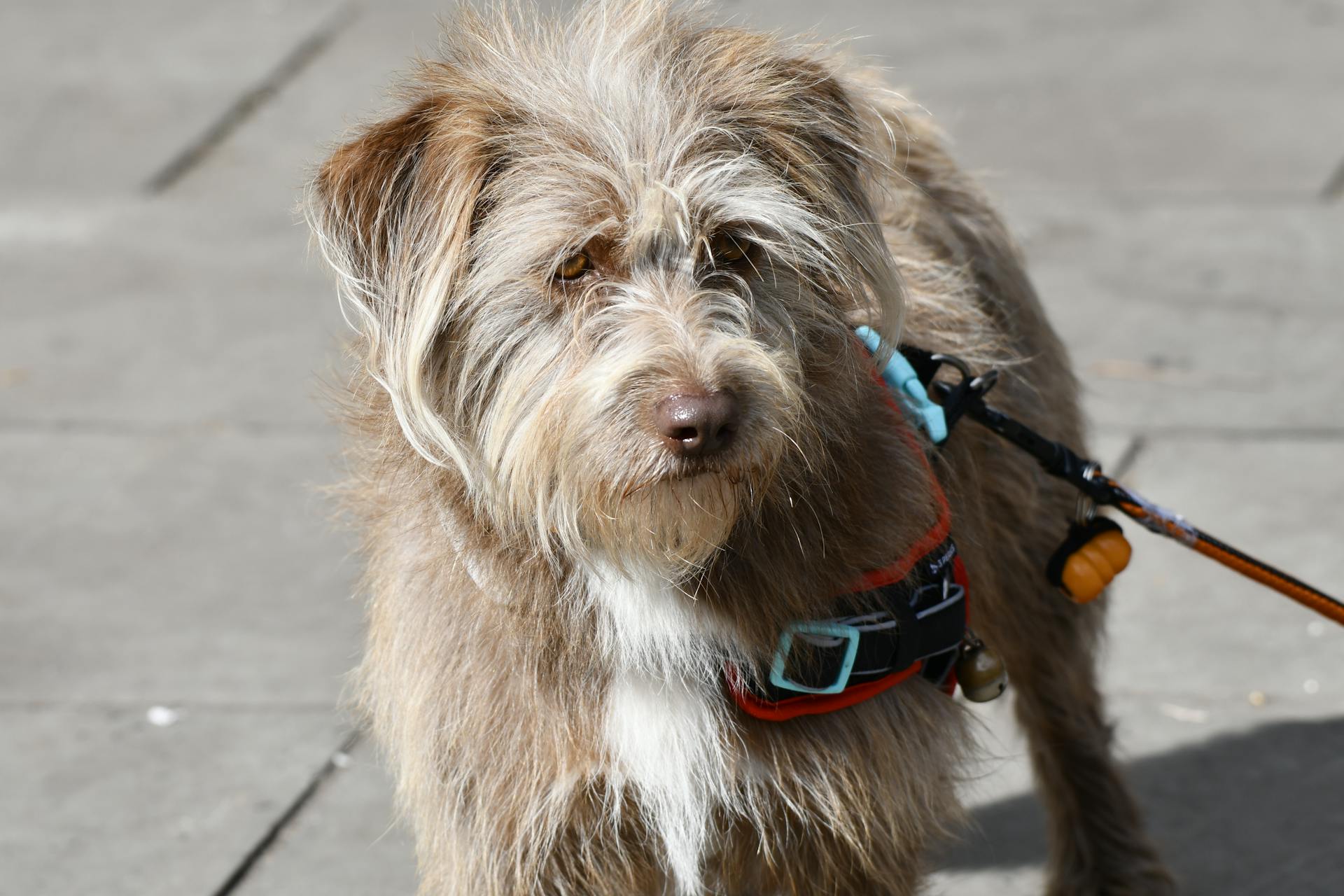
The Wire Haired Dutch Shepherd is a breed that's steeped in history and heritage. They originated in the Netherlands in the late 19th century as a herding dog.
These dogs are highly intelligent and trainable, which makes them a popular choice for search and rescue, police work, and as service dogs. They're also known for their loyalty and protective instincts.
One of the most distinctive features of the Wire Haired Dutch Shepherd is their coat, which is wiry, dense, and weather-resistant. This coat requires regular grooming to prevent matting and tangling.
Their energy level is high, and they need plenty of exercise to stay happy and healthy.
A fresh viewpoint: Dogs Breeds That Start with B
History of the Breed
The Dutch Shepherd breed has a rich history that dates back to the late 1800s in the Netherlands. They were prized for their ability to adapt to various tasks on farms.
Their intelligence and endurance made them highly valued for herding, guarding, and other farm work. They were often used as farm guard dogs and could even pull carts.
Suggestion: Great Pyrenees Farm Dog
In the 19th century, the Netherlands had high volumes of arable and livestock farming, which made the Dutch Shepherd's skills in demand. Their all-round capabilities made them a versatile breed.
The first breed standard was recognized in 1898, and it was updated in 1914 to only accept brindle coloring. This helped distinguish them from their German and Belgian shepherd relatives.
By the early 20th century, farming became more industrialized, and land reclamation was common. This reduced the need for the Dutch Shepherd's skills, making them a rare breed.
During World War II, breeding nearly came to a halt, and many dogs perished. The breed was on the brink of extinction, but enthusiasts reestablished breeding programs after the war.
The Dutch Shepherd is still considered a rare breed today, but they are highly valued for their trainability and blind devotion. They are often used by law enforcement and militaries around the world.
Intriguing read: How Rare Are White German Shepherds
Characteristics
The Wire Haired Dutch Shepherd is a remarkable breed, and one of its standout characteristics is its high intelligence. They are known to be highly trainable, which makes them excel in obedience and agility training.
Their high energy level also makes them perfect for active families who enjoy outdoor activities. With regular exercise, they can stay happy and healthy, and even excel in dog sports.
Here's a breakdown of their key characteristics:
Their protective instinct is another notable characteristic, making them excellent watchdogs and guard dogs. However, with proper socialization and training, they can be loyal and affectionate companions for their families.
Appearance
The Dutch Shepherd is a medium-sized dog with a strong, muscular body. They are slightly smaller in females than in males.
Their body structure is similar to that of German and Belgian Shepherds, which is no surprise given their close ancestry.
The Dutch Shepherd comes in several different colors, including brindle, gray brindle, silver brindle, gold brindle, blue gray, and salt and pepper.
They have an intelligent expression and can have three different coat types: short, long, and wire-haired.
The short-hair coat should be close fitting to the body, harsh in texture with a woolly undercoat.
For more insights, see: Different Breeds of Shih Tzu
A Dutch Shepherd's coat is unique and can be in a variety of colors, but the coloring pattern is always brindle.
They can have some white markings, but those are not desirable in a show ring.
The Dutch Shepherd has a woolly undercoat in all three coat types: short, long, and wire-haired.
Their coat should be close to the body, and they will have a beard and two well-defined eyebrows.
The wire-haired coat is harsh, tousled, and very dense, with a dense undercoat everywhere except the head.
Size
Dutch Shepherds come in a range of sizes, with males typically standing between 22 to 25 inches tall.
The breed's weight can vary, but most Dutch Shepherds weigh between 50 to 70 pounds.
Males are slightly larger than females, with males standing about 1-2 inches taller on average.
Females, on the other hand, tend to be slightly shorter, ranging from 21 to 24 inches in height.
Some individuals in the breed may be larger or smaller than these standard sizes.
Temperament
Dutch Shepherds are highly intelligent dogs that thrive on mental and physical stimulation. They are known for their all-around competency in various tasks, including agility, herding, and police work.
Their high trainability makes them relatively easy to train, and they are eager to please their owners. They can excel in obedience and agility training due to their sharp minds and strong work ethic.
Dutch Shepherds are naturally cautious around strangers and can be great protectors of their families. They make excellent watchdogs and can be trained as guard dogs.
However, they require a confident trainer who can set boundaries and keep them interested in learning. Early socialization training is also crucial to help them stay calm around new people and pets.
Here's a summary of the Dutch Shepherd's temperament traits:
Overall, Dutch Shepherds are loyal and affectionate dogs that make great family companions when provided with proper socialization and training.
Exercise Needs
Dutch Shepherds are extremely active dogs that require regular exercise to stay happy and healthy. They need daily walks and exercise sessions that range between 30 to 60 minutes.
If this caught your attention, see: How Much Exercise Do Border Collies Need
Ideally, a Dutch Shepherd will live with a family that offers them a chance to "work" since they excel in competitive dog sports like agility, nose work, and obedience. This is because they love to run and engage in physical activities.
If you're considering bringing a Dutch Shepherd into your family, be prepared to provide them with plenty of exercise and mental stimulation. They are intelligent and trainable, making them relatively easy to train.
To give you a better idea of their exercise needs, here are some examples of activities that are suitable for Dutch Shepherds:
- Running
- Agility training
- Nose work
- Obedience training
- Playing Frisbee
Remember, a Dutch Shepherd that receives appropriate amounts of mental and physical enrichment will be usually reserved and calm around the home, and not regarded as high maintenance.
Care
Wire-haired Dutch Shepherds require regular health screenings and genetic testing to monitor for potential issues like hip dysplasia and hereditary eye diseases.
Their grooming needs vary depending on coat type, but all require regular brushing, with rough-haired varieties sometimes needing professional grooming.
Daily exercise is crucial to meet their high energy levels, which can be satisfied with activities like walking, running, and canine sports.
Consistency and positive reinforcement are key to their obedience training, as they're highly intelligent and eager to learn.
A balanced diet is essential, with portion control and high-quality dog food helping to maintain their health and fitness.
They're not suited to being left alone for long periods, and problem behaviors can surface if they don't receive enough enrichment.
Regular veterinary check-ups are necessary, along with at-home care recommended by your veterinarian.
Their nails grow quickly and need to be trimmed as needed, while their ears should be checked weekly and cleared of any debris or wax buildup.
Brushing their teeth regularly is also important to prevent issues.
Daily exercise needs include at least one good, long walk per day and some vigorous play sessions to keep them mentally and physically stimulated.
Recommended read: Are Border Collies High Maintenance
Health
The wire-haired Dutch Shepherd is generally a very healthy breed, with an average lifespan of 11 to 14 years. They can live a long and happy life with proper care and attention.
Hip dysplasia is a common health issue in Dutch Shepherds, including the wire-haired variety. It's a genetic condition that can lead to arthritis or lameness, and regular veterinary check-ups can help identify it early on.
Goniodysgenesis is another condition that can affect wire-haired Dutch Shepherds, particularly in severe cases, it can lead to blindness. Annual eye examinations by a certified veterinary ophthalmologist are recommended to screen for inherited eye diseases.
Here are some recommended health tests for wire-haired Dutch Shepherds:
- Eye Examination: Annual eye examinations by a certified veterinary ophthalmologist are recommended to screen for inherited eye diseases.
- Hip Evaluation: An OFA (Orthopedic Foundation for Animals) or PennHIP evaluation is recommended to screen for hip dysplasia.
- DNA Test for DM: A genetic test is available to determine if a dog carries the gene mutation responsible for degenerative myelopathy.
Regular veterinary check-ups, a balanced diet, and maintaining a healthy lifestyle, including appropriate exercise, are key factors in promoting the long-term health of wire-haired Dutch Shepherds.
Health Problems
Dutch Shepherds are generally a healthy breed, but like all breeds, they can be prone to certain health issues. Regular veterinary check-ups, a balanced diet, and maintaining a healthy lifestyle are key factors in promoting their long-term health.
Hip dysplasia is a common problem in Dutch Shepherds, particularly in large breed dogs. A genetic condition where the thigh bone doesn't fit snugly into the hip joint, it can lead to arthritis or lameness.
Take a look at this: Hip Problems in Border Collies
An OFA or PennHIP evaluation is recommended to screen for hip dysplasia. This test can help identify the condition early on, making it easier to manage.
Elbow dysplasia is similar to hip dysplasia, affecting the elbow joints and potentially leading to painful lameness. An OFA evaluation can help identify elbow dysplasia early on.
Goniodysgenesis is a hereditary condition that can lead to glaucoma, characterized by improper eye drainage system development. It's more often seen in wire-haired Dutch Shepherds.
Inflammatory myopathy is a progressive disease that involves the rapid degeneration of muscles. Unfortunately, there is no cure, but it's possible to health screen parents to avoid puppies developing the condition.
Here's a list of common health issues in Dutch Shepherds and the recommended tests for these conditions:
- Hip Dysplasia - OFA or PennHIP evaluation
- Elbow Dysplasia - OFA evaluation
- Goniodysgenesis - Annual eye examinations by a certified veterinary ophthalmologist
- Inflammatory Myopathy - Health screening of parents
Dutch Shepherds are generally a healthy breed, but it's essential to be aware of these potential health issues and take proactive steps to maintain their well-being.
Return
If you're considering bringing a Dutch Shepherd into your family, it's essential to think about their health needs. They can be prone to certain health issues, but with the right breeder and care, you can minimize the risks.
Dutch Shepherd breeders should have all the necessary documents and licenses for breeding, so make sure to ask about these when searching for a reputable breeder.
These dogs are energetic and demanding, which means they require regular exercise and mental stimulation to stay happy and healthy. A Dutch Shepherd puppy can cost from $1,000 to $1,500, which is a significant investment.
Asking the breeder for health checks on the puppy and its parents can give you a better understanding of their overall health and any potential issues that may arise. A registered and reputable breeder should be able to provide this information without hesitation.
A different take: Will Shiba Inu Reach .01
Estimated Cost
The estimated cost of owning a Wire Haired Dutch Shepherd can vary, but there are some specific expenses to consider. The cost of veterinary care can range from $200 to $600 per year, depending on your location and the level of care your dog requires.
Basic grooming supplies, such as dog-safe shampoos and nail trimmers, can cost between $100 to $300. If you choose to perform simple grooming tasks at home, you'll need to invest in these supplies.
Expand your knowledge: Shih Tzu Puppy Care
Your Wire Haired Dutch Shepherd will need toys, chews, wellness supplements, car safety equipment, and other supplies throughout their life, which can add up to $50 to $200 per year.
Professional training is essential, but it can be expensive, costing between $500 to $2,500. It's worth considering the cost of training when deciding whether to bring a Wire Haired Dutch Shepherd into your family.
Here's a breakdown of the estimated annual costs:
The total estimated annual cost of owning a Wire Haired Dutch Shepherd can range from $3,050 to $8,500, depending on various factors.
Training and Maintenance
Training a wire-haired Dutch Shepherd requires a lot of mental stimulation, so break up training sessions into shorter, more frequent sessions with plenty of repetition.
They're extremely intelligent and eager to please, learning new commands after just a few repetitions, but they can be strong-willed and independent, so it's essential to establish yourself as the alpha.
To keep your wire-haired Dutch Shepherd happy and well-adjusted, provide plenty of physical and mental exercise, such as playtime, running, and a specific job to perform.
Training

Dutch Shepherds are one of the smartest dog breeds, so they'll pick up training cues quickly. They thrive on mental stimulation and enjoy learning, but their natural guarding instincts require training to channel their protective nature.
Early and ongoing training is essential to ensure they don't become too focused on herding and chasing. This breed excels in competitive dog sports like agility, nose work, and obedience, so be prepared to engage their minds.
Their intelligence also means they can be strong-willed and independent, so it's crucial to establish yourself as an alpha. This will help them understand boundaries and respect your authority.
Training sessions should be shorter, with little repetition, to keep them engaged and driven. As they become more mentally stimulated, they'll become more eager to please and learn.
Dutch Shepherds are naturally dominant, so socialization is vital to prevent potential problems and incidents. Exposing them to various sights, sounds, and situations will help them stay calm around new people and animals.
Curious to learn more? Check out: Shiba Inu $1
Maintenance

To keep your Dutch Shepherd happy and healthy, it's essential to provide plenty of physical and mental exercise. This can be as simple as taking them on a daily run or playtime in the yard.
Regular grooming is also a must, especially for the long-hair and wire-hair varieties. They'll need a steel comb and natural bristle brush to remove dead and loose hairs.
For the wire-hair variety, plucking their coat twice a year is a must, but be sure to take them to a professional groomer if you're unsure of how to do it correctly.
Frequently Asked Questions
What are the three types of Dutch Shepherds?
The Dutch Shepherd comes in three distinct coat types: short, long, and wire-haired. Each coat type has its own unique characteristics, from the short, harsh texture to the longer, woolly undercoat.
Are Dutch Shepherds good house dogs?
Dutch Shepherds thrive in active households with families who can meet their exercise and training needs. They can make wonderful family dogs with proper care and attention.
What is the lifespan of a Dutch Shepherd?
A Dutch Shepherd's average lifespan is 11-14 years, with proper care and nutrition playing a significant role in their longevity.
Featured Images: pexels.com


